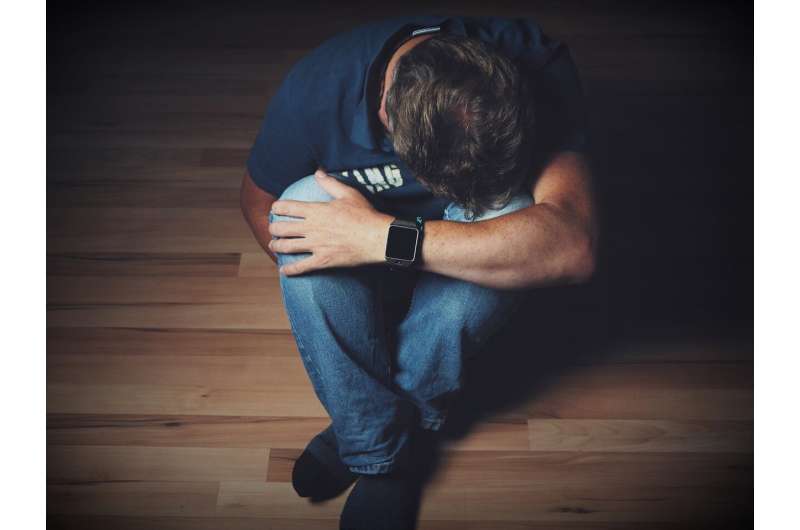This article has been reviewed according to Science X's editorial process and policies. Editors have highlighted the following attributes while ensuring the content's credibility:
fact-checked
proofread
People living with HIV at substantially higher risk of depression and suicide

People living with HIV (PLWH) are far more likely to be diagnosed with depression, take antidepressants, be treated with electroconvulsive therapy, and commit suicide than population controls, especially in the first two years after diagnosis, according to new research being presented at this year's European Congress of Clinical Microbiology & Infectious Diseases (ECCMID) in Copenhagen, Denmark (15–18 April).
The nationwide study in Denmark comparing almost 6,000 PLWH with over 59,000 matched controls over 20 years, indicates that in the first two years after diagnosis PLWH were around three times more likely to develop depression, use antidepressants and undergo electroconvulsive therapy (ECT), and were 10 times more likely to commit suicide compared to their counterparts without HIV.
"It's much higher than I expected," says lead author Dr. Lars Omland from Copenhagen University, Denmark. "Our findings clearly highlight the serious mental health implications of being given a diagnosis of HIV and the importance of clinicians looking out for of symptoms of depression in this high-risk population. Caring for people with HIV, which has traditionally focused on their physical health, should place more emphasis on their mental health."
Previous studies have suggested that HIV infection might be associated with depression, but have been inconclusive. And no studies have looked at whether familial factors might influence the link between HIV infection and depression.
To find out more, researchers used Denmark's national health registers to look for records of depression (diagnoses, use of antidepressants, ECT, and suicide) in 5,943 individuals diagnosed with HIV (25% women, average age at inclusion 38 years) between 1995 and 2021. They compared PLWH's risk of depression with 59,430 sex- and date-of-birth matched controls from the general population. They also compared the risks between 5,807 siblings of PLWH and 82,411 siblings of controls.
The researchers adjusted for a range of factors likely to influence the results, sex and age.
Overall, PLWH had double the risk of depression and treatment with ECT compared to controls, 1.5 times greater risk of antidepressant use, and 3.5 times increased risk for suicide. The risks were much higher in the two years after diagnosis.
When comparing yearly proportions (percentage) of participants using psychiatric hospitals (as inpatients or outpatients) due to depression and use of antidepressants in the 10 years before and after study inclusion, the analysis found an increased proportion of psychiatric hospitals use both prior to, and especially after HIV diagnosis for PLWH. For instance, two years before study inclusion, 6.4% of PLWH used antidepressants, which was 1.2% more than controls. This difference increased to 3.1% two years after study inclusion.
Interestingly, siblings of PLWH also faced an increased risk of depression diagnosis, use of antidepressants, and suicide compared to population controls, but lower than for PLWH. This suggests that family-related factors are unlikely to explain the greater risk observed in PLWH.
"The higher risk of developing depression and suicide in both people living with HIV and their siblings is very troubling, and we need to dig deeper to understand the causes," says Dr. Omland." One potential explanation for the increased risk of depression and suicide among siblings of people living with HIV could be stress and stigma related to a loved one being diagnosed with a chronic disease. It's also possible that risk factors for depression and HIV-infection overlap."
The authors point out that although the study was large, it was observational, and they cannot rule out the possibility that other unmeasured factors such as alcohol and illicit drug use and uncontrolled for confounding factors may have influenced the results. They also note that the study was conducted in Denmark, so the results may not apply to other populations.



















